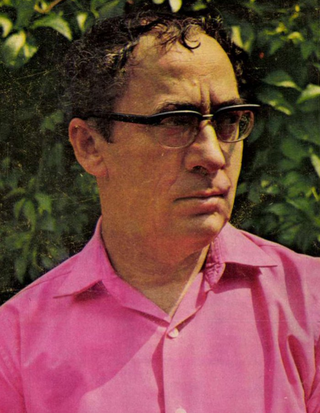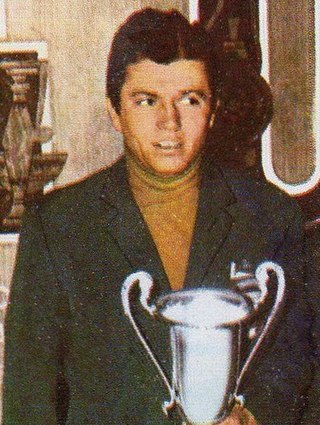
Nicolae Rădescu was a Romanian army officer and political figure. He was the last pre-communist rule Prime Minister of Romania, serving from 7 December 1944 to 1 March 1945.
România liberă is a Romanian daily newspaper founded in 1943 and currently based in Bucharest. A newspaper of the same name also existed between 1877 and 1888.

The Spartakiad was an international sports event that was sponsored by the Soviet Union. Five international Spartakiades were held from 1928 to 1937. Later Spartakiads were organized as national sport events of the Eastern Bloc countries. The games were organised by Red Sport International.

Marin Preda was a Romanian novelist, post-war writer and director of Cartea Românească publishing house. He is considered by some to be the most important novelist in post-World War II Romanian literature. However, he has also garnered an ambivalent perception in post-socialist Romania: Preda's final novel, Cel mai iubit dintre pământeni, published just a couple of months before his death, is a daring critique of the beginnings of communism in Romania; in contrast, Preda was well-regarded by party leaders and received high distinctions in socialist Romania, and did not position himself as an open opponent of the regime. At the time of his death, Marin Preda was a member of the Great National Assembly.
Adevărul is a Romanian daily newspaper, based in Bucharest. Founded in Iași, in 1871, and reestablished in 1888, in Bucharest, it was the main left-wing press venue to be published during the Romanian Kingdom's existence, adopting an independent pro-democratic position, advocating land reform, and demanding universal suffrage. Under its successive editors Alexandru Beldiman and Constantin Mille, it became noted for its virulent criticism of King Carol I. This stance developed into a republican and socialist agenda, which made Adevărul clash with the Kingdom's authorities on several occasions. As innovative publications which set up several local and international records during the early 20th century, Adevărul and its sister daily Dimineața competed for the top position with the right-wing Universul before and throughout the interwar period. In 1920, Adevărul also began publishing its prestigious cultural supplement, Adevărul Literar și Artistic. By the 1930s, their anti-fascism and the Jewish ethnicity of their new owners made Adevărul and Dimineața the targets of negative campaigns in the far right press, and the antisemitic Octavian Goga cabinet banned both upon obtaining power in 1937. Adevărul was revived by Barbu Brănișteanu after World War II, but was targeted by Communist Romania's censorship apparatus and again closed down in 1951.
"Te slăvim, Românie" was the national anthem of the Romanian People's Republic, and later Socialist Republic of Romania between 1953 and 1975. The lyrics were written by Eugen Frunză and Dan Deșliu, the music by Matei Socor. It mentions Romania's brotherhood with the Soviet Union and praises Leninist ideology.

Mass games or mass gymnastics are a form of performing arts or gymnastics in which large numbers of performers take part in a highly regimented performance that emphasizes group dynamics rather than individual prowess.

Remus Cernea is a Romanian activist against discrimination based on faith and religion, an advocate of the separation of church and state and the founder of the Solidarity for Freedom of Conscience Association. From 2012 to 2016, he served as a member of the Chamber of Deputies. He was also president of the Green Party (PV).

Ioan Gyuri Pascu was a Romanian pop music singer, producer, actor, and comedian, also known for his participation in the comedy group Divertis and for his activity in Romanian cinema and television. Moving between rock music, rhythm and blues, reggae, and jazz, the multi-instrumentalist Pascu founded a number of bands and registered success particularly during the early 1990s, when he was the lead singer of a group known as The Blue Workers. Pascu was the manager of several alternative music acts with his label Tempo Music and remained an outspoken critic of Romanian commercial radio.

Club Sportiv Municipal Flacăra Moreni,, commonly known as Flacăra Moreni or simply as Flacăra, is a Romanian football club based in Moreni, Dâmbovița County.

Carlton Bloc was a residential block located in Bucharest, Romania, at 9 Nicolae Bălcescu Boulevard, completed in October 1936. Having 14 floors and a height of 47 metres (154 ft), it was the tallest building in the capital until it completely collapsed in 1940 in an earthquake.
Eugen Taru was a Romanian graphic artist, best known for his work in the political cartoon, caricature, comic strip, and book illustration genres. Active throughout the communist period and first acknowledged as one among the young socialist realists promoted by the regime, Taru primarily associated with satirical magazines such as Urzica.

The 2013 European Youth Olympic Winter Festival was an international multi-sport event held between 17 and 22 February 2013, in Braşov, Romania, with some of the events also held in Râșnov, Predeal and Fundata. It was the 11th edition of the European Youth Olympic Winter Festival.

Viorel Hrebenciuc is a Romanian politician and statistician. A member of the Social Democratic Party (PSD), he was also a member of the Chamber of Deputies of Romania for Bacău County from 1996 to 2014.

Gheorghe-Eugen Nicolăescu is a Romanian economist and politician. A member of the National Liberal Party (PNL), he was a member of the Romanian Chamber of Deputies for Mureș County from 2000 to 2008 and has represented Călărași County there since 2008. In the Călin Popescu-Tăriceanu cabinet, he served as Minister of Health from 2005 to 2008.
Arise Gheorghe, Arise Ioan! is a poem by Radu Gyr. In 1958 Radu Gyr was imprisoned and sentenced to death by the communist authorities of the Romanian People's Republic because of his subversive poem. The poem had asked for peasants to oppose in every way the regime's agricultural policies: it had been issued as the last wave of brutal collectivization was taking hold of the rural landscape. According to Orthodox priest Fabian Seiche, while in prison, Gyr was not treated for any illnesses he had, was often starved, and even tortured.
Ender Petru Sudureac is a retired amateur Romanian Greco-Roman wrestler, who competed in the men's heavyweight category. Sudureac has claimed a silver medal in the 97-kg division at the 1995 World Wrestling Championships, and later represented his nation Romania in two editions of the Olympic Games. Throughout his sporting career, Sudureac trained as part of the Greco-Roman wrestling team for Dinamo București, under his coach Nicolae Zamfir.

Stadionul Tineretului is a multi-use stadium in Oradea, Romania. The stadium was opened on 4 June 1895 as part of the sports pavilion of the Rhédey Garden. Located in the southwestern part of the city between Nicolae Bălcescu Park and Oradea Zoological Garden, the stadium is considered to be the birthplace of many sports in the city located on the banks of the Crișul Repede river. Besides historical and sentimental value, the arena has also an architectural value, in the northern end of the stadium being a ground floor building and two small towers originally built to serve for dancing, a new restaurant and a buffet. The building is the work of famous architects Kálmán Rimanóczy Sr. and Kálmán Rimanóczy Jr.
Events from the year 2007 in Romania.

The Romanian national bobsleigh team represents Romania in international bobsledding competitions.













